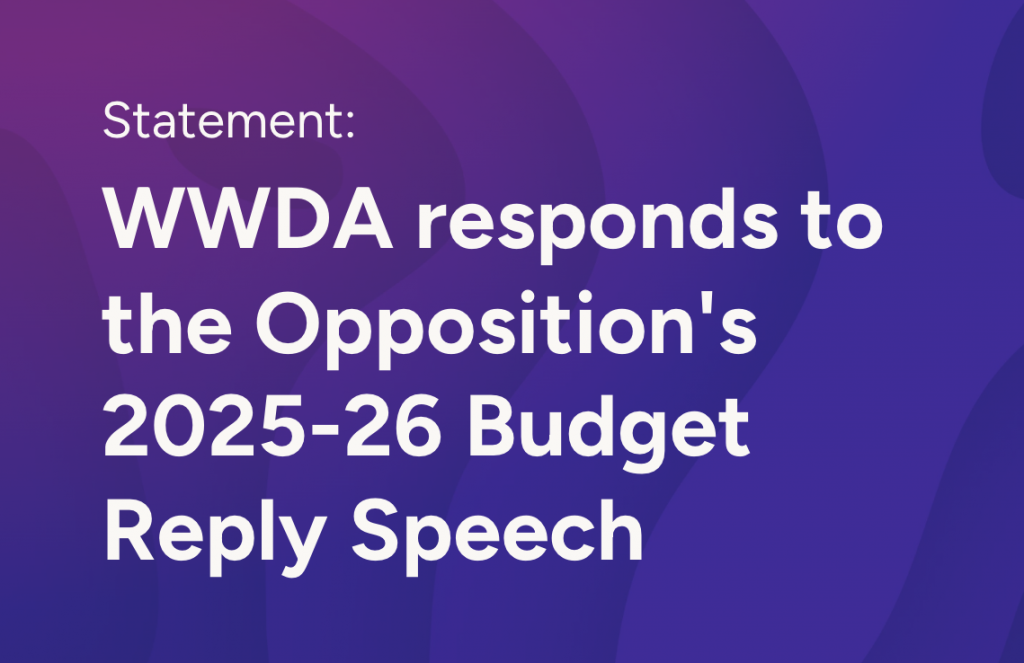Women With Disabilities Australia (WWDA) notes that women, girls, and gender-diverse people with disabilities are absent from the Opposition Leader’s Budget Reply Speech. In a speech, where commitments were made across almost every policy area, the needs, rights and contributions of women with disabilities were overlooked.
Invisible in the Vision for Australia
The Opposition Leader presented what was said to be a “positive plan” for a “stronger, safer, and better Australia,” but did not articulate how women with disabilities fit into this vision. In fact, people with disabilities were not addressed in general.
While the Opposition Leader mentioned the NDIS in passing – with a commitment to “continue to invest” – there was no substantive policy addressing how the 1 in 5 women in Australia who have disability would be supported
Healthcare Concerns
We acknowledge the Opposition’s commitment to invest $9.4 billion in healthcare, including $500 million specifically for women’s health. This is a welcome commitment to improve health outcomes for many women across Australia. However, without targeted measures to address the significant barriers that women and gender diverse people with disabilities face in accessing health services, existing inequities will continue.
The Opposition has committed to doubling subsidised mental health sessions from 10 to 20. This will benefit women and gender diverse people with disabilities, many of whom experience distress because of disproportionately high rates of violence, discriminatory attitudes and barriers to community and workforce participation. However, there were no commitments to addressing the systemic accessibility barriers that prevent women with disabilities from accessing mental health services at the outset.
Concerningly, there was no mention of addressing critical issues raised by the Disability Royal Commission, including forced sterilisation practices and violations of women with disabilities’ sexual and reproductive rights.
Workforce Participation and Economic Security
The proposed plan to cut 41,000 public service jobs raises concerns for women with disabilities, who already face disproportionate barriers to meaningful employment. The public service aims to model inclusive employment practices, and these cuts could disproportionately impact women and gender diverse people with disabilities working in these roles.
The proposed changes to workplace relations and casualisation of the workforce could further disadvantage women and gender diverse people with disabilities, who are less likely to be employed on a permanent basis.
Housing Accessibility and Safety
While the Budget Reply outlined plans to invest $5 billion in housing infrastructure, there was no mention of accessible housing or universal design standards. For women and gender diverse people with disabilities, particularly those fleeing violence, the lack of accessible housing options represents a critical barrier to safety.
After one of the worst years of gender-based violence on record, the proposed answer is to “toughen bail laws to stop domestic violence offenders”. There is no vision to resource the critically under-funded prevention sector and ensure response services are accessible for women with disabilities. This omission is particularly concerning given the Opposition’s focus on community safety.
This underscores the urgent need for the reforms we are advocating for in our 2025 Federal Election Platform.
NDIS and Disability Supports
The commitment to “continue to invest” in the NDIS is welcome, but the lack of specificity provides little reassurance about how the Opposition would ensure sustainable and equitable access to vital disability supports for women and gender diverse people with disabilities. The absence of any commitment to foundational supports outside the NDIS is similarly concerning.
Call to Action
As we approach a federal election, WWDA calls on all political parties to:
- Explicitly recognise and address the intersection of gender and disability in all policy areas.
- Transparently negotiate sustainable funding arrangements for foundational supports. Foundational supports must address the unmet need in support access for women and gender-diverse people with disabilities- regardless of their NDIS status.
- Commit to accelerating and fully implementing key recommendations of the Disability Royal Commission, with specific attention to the sexual and reproductive rights of women with disabilities.
- Ensure that economic policies recognise and support the economic participation and security of women with disabilities.
- Guarantee that any reforms to the NDIS are co-designed with women and gender diverse people with disabilities.
- Include universal design principles in all housing and infrastructure policies.
Women, girls, and gender-diverse people with disabilities constitute a significant proportion of the Australian population. We must be more than an afterthought in major policy announcements. WWDA will continue to advocate for a society in which our rights, contributions, and leadership are fully recognised and valued.
For media enquiries, contact: officeadmin@wwda.org.au.
About Women with Disabilities Australia (WWDA):
Women With Disabilities Australia (WWDA) is the national Disability Representative Organisation and National Women’s Alliance for women, girls and gender diverse people with disabilities in Australia. We work to protect, promote and advance the rights of women, girls and gender diverse people with disabilities in Australia, amplify their voices, and dismantle systemic barriers. We advocate for human rights, challenge discrimination, and promote policies that enable all women with disabilities to thrive. For more information, visit www.wwda.org.au

